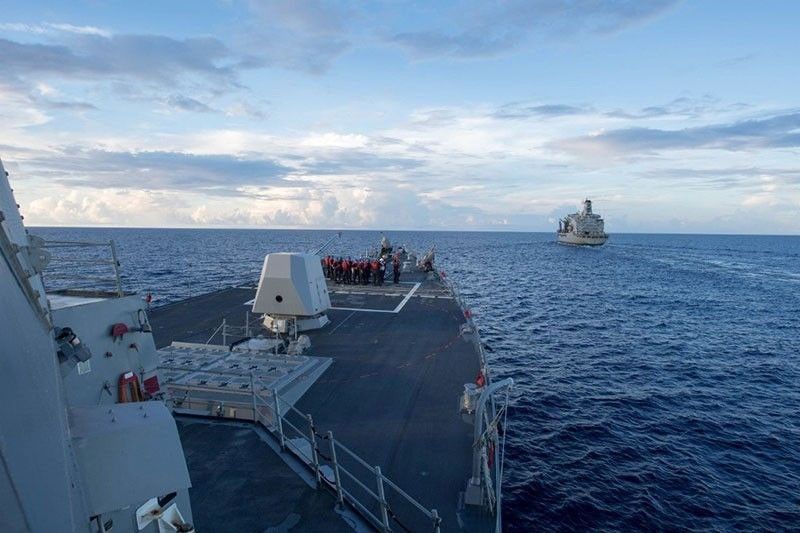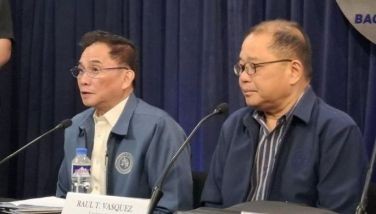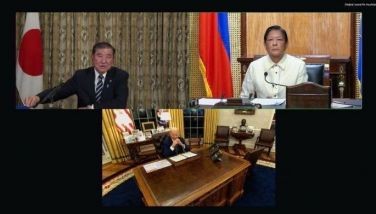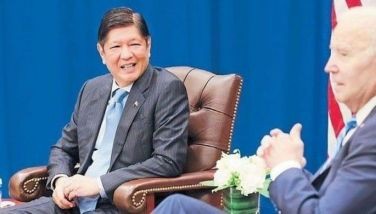Anti-submarine drills set in South China Sea

Philippines, Australia, Japan, US naval exercises to be held on April 7
MANILA, Philippines — The Philippines and regional allies the United States, Japan and Australia are planning anti-submarine drills in the South China Sea on April 7.
Reports by Kyodo News, as carried by Reuters, said the planned drill would mark the first such full-fledged exercise in the South China Sea for the navies of the four countries, and is likely aimed at demonstrating solidarity with the Philippines against China’s growing assertiveness, according to the news report, citing multiple sources.
No other details were given.
The report on the planned naval exercise came as the Philippines’ top security adviser and his US counterpart discussed over the phone on Monday the “recent spate of illegal, coercive, aggressive and deceptive actions” of the China Coast Guard and maritime militia in Philippine waters.
In their phone conversation, National Security Adviser Eduardo Año and his US counterpart Jake Sullivan also vowed to keep communication lines open as President Marcos, US President Joe Biden and Japan Prime Minister Fumio Kishida prepare for their inaugural trilateral security summit in Washington on April 11, National Security Council
assistant director general Jonathan Malaya said yesterday.
The phone call came on the heels of a series of maritime run-ins and heated verbal exchanges between China and the Philippines.
During the call, Malaya said Año expressed his appreciation for the continued assurances and reaffirmation of the US of its ironclad commitment to its alliance with the Philippines.
President Marcos said last week there would be “countermeasures” against aggression by China’s coastguard, while Beijing accused the Philippines of treachery and reneging on a promise to tow away from the Ayungin Shoal the BRP Sierra Madre, an old naval vessel grounded intentionally to serve as outpost for Filipino troops.
China claims almost the entire South China Sea as its territory, policed by an armada of coastguard vessels, some more than 1,000 km away from its mainland.
In Manila, the Office of Civil Defense announced the launch of the 2024 Balikatan exercises by the third week of April up to the first week of May. The OCD also declared as fake an online video report on the supposed arrival of military equipment from the US and France for use in a joint military training of US and Filipino soldiers.
“The Office of Civil Defense learned that a video was published online, reporting the ‘arrival of military equipment from the United States and France’ in the Philippines. Stated in the video was misinformation/disinformation involving the agency and its Civil Defense Administrator, Undersecretary Ariel Nepomuceno,” the OCD noted.
The OCD clarified that Nepomuceno is not the commandant of the Philippine Marine Corps as claimed in the video posted on YouTube, and that “no statement was issued by him or the agency regarding the matter considering that it is not within its purview.”
“Further, video/photos of Usec. Nepomuceno shown in the video are during a press conference on El Niño preparations in 2023. The agency reminds the public to follow only those credible and reliable sources and refrain from sharing unverified information,” the OCD said.
Meanwhile, some lawmakers said the administration should exhaust all diplomatic measures to resolve the country’s maritime spat with China, citing the Philippines trade relations with the Asian giant.
“This issue cannot be solved overnight by one President alone. What is important is that we are seeing concrete steps that the leadership of the country will not yield even an inch of our territory,” House Deputy Majority Leader Janette Garin said.
“Of course, exploring diplomatic means can also be an option. What is important is that we continuously fight for what is truly ours,” the first district congresswoman from Iloilo told reporters at a news briefing Monday.
Garin said the addressing the West Philippine Sea should not be to the detriment of trade relations with China, which is a major trading partner of Manila.
“On a personal note, and being a mother, I will not agree that we sever our economic ties with them because China, as well as other countries, are also trading partners that the Philippines need. We export our products to them, and we import products from them,” she pointed out.
“This relationship has been a very big help to our economy,” Garin said, advising foreign affairs officials to sit down and discuss ways to settle the issue amicably.
House Minority Leader Marcelino Libanan said the Philippines and China can still resolve their differences despite recent developments in the West Philippine Sea.
Libanan also expressed concerns that international news reports of worsening tensions in the West Philippine Sea “might dampen the Philippines’ efforts to attract additional foreign direct investments that are badly needed to produce new jobs for Filipinos.”
“We are very concerned that prospective foreign investors might misperceive and misunderstand the tensions as a looming security risk,” he said.
Libanan, who represents the 4Ps party-list, noted that the President himself has been visiting other countries “precisely to encourage their corporations to put up factories in the Philippines.” — Pia Lee-Brago, Delon Porcalla, Reuters
- Latest
- Trending































